7am: George Bush's eagerly-awaited autobiography Decision Points was published in the US a couple of hours ago.
Here's his sales pitch.
The book weighs-in at 497 pages in 14 chapters. Our Washington office managed to get hold of a copy and spent much of yesterday speed reading its contents.
Here are some of the key subjects covered:
Plans to attack Iran's nuclear facilities
I directed the Pentagon to study what would be necessary for a strike. This would be to stop the bomb clock, at least temporarily.
Consideration of a secret strike against Syria
We studied the idea seriously, but the CIA and the military concluded it would be too risky to slip a team into and out of Syria.
Bush's first call after the September 11th attack was with the prime minister.
The conversation helped cement the closest friendship I would form with any foreign leader. As the years passed and the wartime decisions grew tougher, some of our allies wavered. Tony Blair never did.
The region is more hopeful with a young democracy setting an example for others to follow. And the Iraqi people are better off with a government that answers to them instead of torturing and murdering them. There are things we got wrong in Iraq, but the cause is eternally right.
No doubt the procedure was tough, but medical experts assured the CIA that it did no lasting harm. I knew an interrogation programme this sensitive and controversial would one day become public. When it did, we would open ourselves up to criticism that America had compromised our moral values. I would have preferred that we get the information another way. But the choice between security and values was real.
The suggestion that I was a racist because of the response to Katrina represented an all-time low. I told Laura at the time that it was the worst moment of my presidency. I feel the same way today. I prided myself on my ability to make crisp and effective decisions. Yet in the days after Katrina, that didn't happen. The problem was not that I made the wrong decisions. It was that I took too long to decide.
9/11
He admitted being as "stunned" as he looked when he was told in that classroom in Florida.
That plane must have had the worst pilot in the world. How could he possibly have flown into a skyscraper on a clear day? Maybe he had a heart attack.
Later:
"My blood was boiling. We were going to find out who did this, and kick their ass."
I badly wanted to bring bin Laden to justice. The fact that we did not ranks among my great regrets. It certainly wasn't for lack of effort … while we never found the al-Qaida leader, we did force him to change the way he travelled, communicated and operated. That helped us deny him his greatest wish after 9/11: to see America attacked again.
He had tremendous appeal to voters under fifty and ran a smart, disciplined, high-tech campaign... I started to think more about what it would mean for an African-American to win the presidency. I got an unexpected glimpse a few days before the election. An African-American member of the White House residence brought his twin sons to the Oval Office. One glanced up around the room and blurted out, "Where's Barack Obama?"
Michael Tomasky, the Guardian's American editor-at-large says it will take more than this memoir to rescue Bush's reputation. "The Bush of Decision Points is a humbler and more measured man than the actual president many Americans remember," he writes. "The most partisan president in modern American history can't just tell us that's not really who he is and not who he meant to be. He needs to show it."
Follow reaction to book throughout the day. If you have read it and spot anything interesting, please tell us about it in the comments section below.
7.30am: Bush gave an hour-long interview with NBC in which he defends waterboarding. It was legal because the lawyers said it was, Bush said. "It was the right thing to do... Using those techniques saved lives. My job was to protect America. That's what I did," he said.
Bush made similar points in an interview with the Times [paywall], arguing that waterboarding helped prevent attacks on Heathrow and Canary Wharf.
"Three people were waterboarded and I believe that decision saved lives." He denied that waterboarding, which simulates drowning, amounted to torture.
Asked if he authorised the use of waterboarding to get information from the captured al-Qaeda leader Khalid Sheikh Mohammed, he was unequivocal: "Damn right!" In his new book he writes: "Their interrogations helped break up plots to attack American diplomatic facilities abroad, Heathrow airport and Canary Wharf in London, and multiple targets in the United States."
7.43am: "Frost / Nixon it was not," writes Hadley Freeman in her review of Bush's interview with NBC's Matt Lauer (the one below).

But if Bush's body language was weird, than his answers at times were paradoxical to a point they could have been crafted by Lewis Carroll.
"Let's talk about waterboarding!" said Bush, with an eager, come-and-get-me arm gesture.
"Why is waterboarding legal?" asked Lauer.
"Because the lawyer said it's legal," Bush retorted.
"Would it be OK for a foreign country to waterboard an American?"
"All I ask is that people read the book," he replied, suggesting that maybe some kind of secret get out clause is hidden within its pages.
7.55am: Bush is unrepentant about the war in Iraq. No surprise there, but he does admit errors. He says the "stagecraft" of that Mission Accomplished speech aboard USS Abraham Lincoln was a big mistake.
Throughout his presidency Bush appeared untroubled by the numerous antiwar protesters. But his book suggests that at least one protester got under his skin.
Writing about a visit to the Dun Cow pub on a tour of Tony Blair's Sedgefield constituency. He writes: "The people were decent and welcoming, aside from the protester who carried a sign that read 'Mad Cowboy Disease'."
I'd love to hear from that protester and find out what he or she makes of the book. Don't all volunteer at once I'm-Spartacus-style. Lots of antiwar protesters have held up similar placards over the years, but Bush is quite specific about the details.
The incident occurred on 21 November 2003. A report about the visit said between 500 and 1,000 people from the Stop the War Coalition turned up that day.
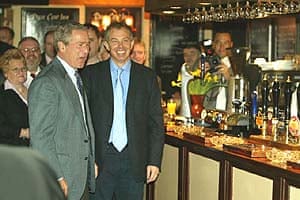
8.18am: Former foreign office minister Kim Howells insisted that waterboarding is torture. Speaking on BBC Radio 4's Today programme Howells, who is also a former chairman of the Intelligence and Security Committee "We have to do everything we can to dissuade governments from using torture," he said. Former shadow home secretary David Davies said apart from the moral wrong people say you want them to say under torture.
"We destroy our own case if we use torture to do it," he told the programme.
8.32am: Back in April Tim Dowling imagined what the Bush book might contain. He didn't get it that wrong on Bush's reaction to the September 11 attacks.
At some point my chief of staff, Andrew Card, whispered to me that America was under attack. Immediately I made the decision to carry on listening to the children. I've faced some criticism for that, but I knew then that I was facing the hardest day of my presidency, with some tough choices ahead of me. I would need all my powers of concentration and judgment, and I couldn't afford to be distracted by wondering how the story ended. I had to find out what happened to that goat.
Here's what Bush actually wrote:
I was stunned. That plane must have had the worst pilot in the world. How could he possibly have flown into a skyscraper on a clear day? Maybe he had a heart attack...
I looked at the faces of the children in front of me. I thought about the contrast between the brutality of the attacks and the innocence of those children. Millions like them would soon be counting on me to protect them. I was determined not to let them down.
The reading lesson continued, but my mind raced far from the classroom. Who could have done this? How bad was the damage? What did the government need to do?
8.40am: "Competent, readable and flat" is the Washington Post's damning verdict on the book.
Bush wants to clean up the record on Iraq, Afghanistan, stem-cell research, Katrina and all the other major controversies that shaped, and bedeviled, his administration. This is understandable. No one who has been at the very epicenter of world affairs for a full eight years wants to be judged unkindly by history, to which in the end every president turns his attention and his hopes. It's a pity, though, that in the process of presenting himself before the bar of history he didn't make a good book out of it.
8.52am: On hurricane Katrina Bush heaps blame for the government's response on the governor Kathleen Blanco.
He wrote:
Who's in charge of security in New Orleans? My question silenced the raucous discussion in the Air Force One conference room on Friday Sept. 2, 2005. The governor is in charge," Mayor Nagin said, pointing across the dark wood table at Gov. Kathleen Blanco. "Every head pivoted in her direction. The Louisiana governor froze. She looked agitated and exhausted. 'I think it's the mayor.'
Blanco hit back today on Nola, the website of the New Orleans paper the Times-Picayune
Instead of immediately sending troops to Louisiana, as I requested, the White House spent days debating the question of federalizing the Louisiana National Guard. That move would have unnecessarily complicated our situation, as I explained to the President at that time, as federalizing would have removed the Guard's inherent power to support local police authority, an increasingly necessary mission in those difficult days.
9.06am: In his Today interview Howells challenged Bush's claim that waterboarding saved lives.
I only heard part of the interview earlier (8.18am), but PA got the key quote from Howells:

I don't think there was any doubt there were real plots. Where I doubt what President Bush has said is that this, what we regard as torture, actually produced information which was instrumental in preventing those plots coming to fruition. I'm not convinced of that.
We think waterboarding is torture and I don't believe that the British security services people had anything to do with it.
My colleagues Haroon Siddique and Chris McGreal have more on Bush's assertion that waterboarding saved lives in Britain.
Writing about the waterboarding of three suspected terrorist, Bush writes:
Their interrogations helped break up plots to attack American diplomatic facilities abroad, Heathrow airport and Canary Wharf in London, and multiple targets in the United States.
9.23am: Bush gave his blessing to the Tea Party movement, in a book publicity interview for Fox News, Politico reports.
In the interview describes the Tea Party as a "good thing" for the US political system, it reports.
I see democracy working. People are expressing a level of frustration or concern, and they're getting involved in the process. And the truth of the matter is, democracy works in America. It inspires me to know that our democracy still functions. What would be terrible is if people were frustrated and they didn't do anything.
9.46am: The Times gives Bush a sympathetic hearing [paywall] after securing an interview with him and publishing rights to extracts of the book. Its editorial on the book expresses "serious caveats" about his presidency, but it concludes:
Critics of Mr Bush confidently assert that he brought the problems upon himself.The trouble that President Obama is having in resetting American foreign policy, and the continued security threat around the world, shows that the question has not gone away. It is on this historic turning point that posterity may be kinder to Mr Bush than his critics are inclined to be today.
9.54am: Did torture prevent terrorism as Bush claimed. My colleague, Vikram Dodd points out that a number of intelligence officials under Bush told Vanity Fair that torture didn't prevented a single attack.
10.04am: Karl Rove, the man described as Bush's brain, has returned to rattling the tin for his old boss. "President Bush trending on @twitter. Decision Points available tomorrow!" he tweeted yesterday, with an Amazon link to the book.
But there has been no word yet from Bush's other key ally Dick Cheney, the former vice president.
In his NBC interview Bush admitted that that his decision not to issue a full pardon Cheney's aide Scooter Libby angered the VP. "I can't believe you're going to leave a soldier on the battle field," Cheney told Bush.
10.31am: What was Bush's all-time low point of his presidency? There are plenty of contenders, but the one he picks out was rapper Kanye West's suggestion that his handling of the aftermath of hurricane Katrina was racist.
I faced a lot of criticism as president. I didn't like hearing people claim that I lied about Iraq's weapons of mass destruction or cut taxes to benefit the rich. But the suggestion that I was racist because of the response to Katrina represented an all-time low
.
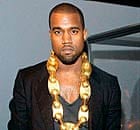
Now West has responded to Bush's words. He sounds a little contrite according to an interview on Rap Radar transcribed by NPR.
Well, I definitely can understand the way he feels, to be accused of being a racist in any way, because… the same thing happened to me, you know, where I got accused of being a racist [after a spat with Taylor Swift].For both situations, it was basically a lack of compassion that America felt in that situation. You know, with him, it was a lack of compassion of him not rushing — him not taking the time to rush down to New Orleans.
Andrew Cohen, writing in the Atlantic, lists a number of other more plausible moments for Bush's all-time low point.
10.54am: Human Rights groups have condemned Bush's claims about the effectiveness of torture.
The Minneapolis-based MinnPost has a full report on the reaction from rights organisations based in its area.
Douglas Johnson, executive of the Center for Victims on Torture, said:
This cavalier attitude by the President who authorized torture in violation of US and international law not only damages our nation's credibility throughout the world, but also discourages global cooperation to combat terrorism.
Richard Killmer, executive director of the National Religious Campaign Against Torture, said:
US-sponsored torture has cost innumerable lives of both American soldiers and civilians, because it has inspired extremists to commit acts of terror against us. It has cost us dearly. Torture does not make us safer; it makes us more of a target.
11.08am: "No one was more sickened than I was when we didn't find weapons of mass destruction [in Iraq]," Bush wrote in the book.
He told NBC that he is still upset about it about (8 minutes into the fourth clip).
But just how sick was he about the failure to find WMD?
He joked about it about at the White House correspondents dinner in 2004. "Those weapons of mass destruction have got to be somewhere," he joked as the audience was shown goofy pictures of Bush looking under his desk and around the Oval office.
Quite sick.
11.26am: Like Tony Blair, Bush pointedly refuses to apologise for the Iraq war. At the end of his evidence to the Chilcot Inquiry Blair was asked if he had any regrets about the invasion. "Responsibility – but not a regret for removing Saddam Hussein. I think he was a monster," he said.
Bush takes a similar line."Apologising would basically say that the decision was the wrong decision. I don't believe it was the wrong decision. The world is better off without Saddam Hussein in power, as our 25 million people who now have a chance to live in Freedom," he told NBC (scroll forward 8 minutes).
11.38am: As some have suggested in the comments sections below there's a campaign to reshelve Bush's book in the crime section of bookshops, following a similar protest against Blair's book.
Our Books site speaks to one of the organisers of the campaign Jasmine Faustino. She calls on readers to "reshelve the book to where it really belongs", and "take a picture of your 'mission accomplished'".
Here's the Facebook page.
11.54am: A very interesting line has just been released by Downing Street.
The prime minister's office said Britain still considered waterboarding to constitute torture.
"It comes under that definition in our view," a No 10 spokeswoman said.
12.30pm: Amnesty expresses its "shock" at Bush's comments. Spokesman Neil Durkin said: "Amnesty is still quite shocked that the former president is clinging to this view that waterboarding is somehow legal."
12.38pm:
Tim Pawlenty, a possible Republican presidential candidate in 2012, gave one of the most positive responses to the Bush's book.
It's rare for Republican leaders to comment on Bush these days, according to the Hill.
1.06pm: Former Bush aide Mark McKinnon writes a glowing account of the book on the Daily Beast.
I'm glad President Bush has published Decision Points—not so much because I think it will help rehabilitate his image or improve his place in history, though I think it will help on those counts.
He also has this comment which seems particularly odd in the light of Bush's buck-passing on Katrina.
I'm glad because I believe readers will get a sense of the George W. Bush who I've known for 15 years—a man who is very different than the distorted public image many have come to accept as accurate. Contrary to conventional wisdom, President Bush is very smart, quietly reflective, often contrite, and deeply humble.
1.12pm: That's enough of George Bush. You can read lots more on our George Bush page.
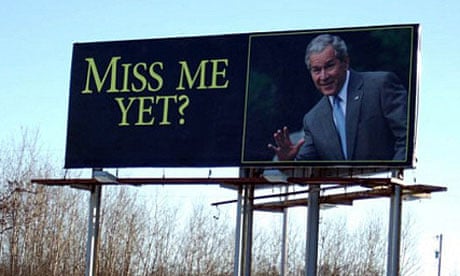
Eh, No.
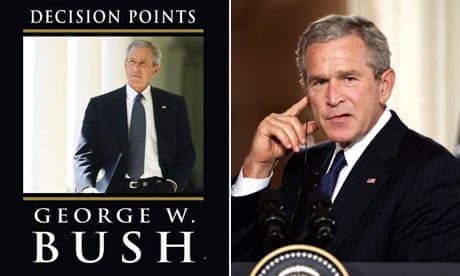
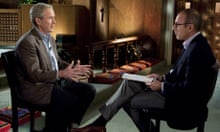

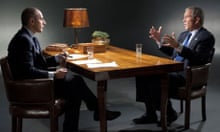
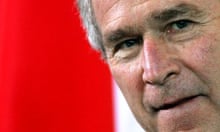
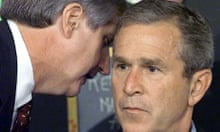

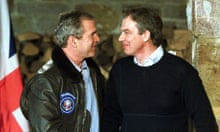
Comments (…)
Sign in or create your Guardian account to join the discussion